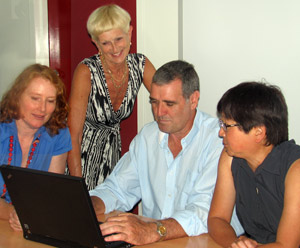School context

School Type: Large rural secondary college
Region: Barwon South West Region
Students: 759 students
Staff: 64 teaching, 20 non-teaching
Principal: Mrs Toni Burgoyne
Accreditation: June 2006
Website:http://www.portlandsc.vic.edu.au
Portland Secondary College’s mission statement is “to develop each student socially, physically and academically, in a safe, yet challenging environment”. The College has had significant Leading Schools’ Funding over the last three years to enable staff to undertake action research with a focus on teaching and learning strategies to improve student learning outcomes.
School approach to the next phase
The school's approach to the next phase:
- education support staff will be included on all College Committees and involved in College decision making
- education support staff with student support, tutoring or aide roles are included in staff professional development activities
- the e5 Instructional Model will be implemented into College curriculum, pedagogy and performance reviews
- peer-to-peer observations form a strong and significant component of teachers’ professional learning and performance goals
- there is a focus on improving College benchmarks.
School approach to each element
Element 1: induction into the school or into a new role
- as part of the formalised induction process the Principal Class Team establishes the expectations of teaching and learning, student management, College core values and staff responsibilities
- a consistent and ongoing induction program caters for the needs of all new staff and commences upon appointment
- all new staff are issued with an Induction Manual that outlines processes in the College
- graduates are paired with both a staff mentor and a VIT Mentor.
Resources
Element 2: multiple sources of feedback on practice
- feedback operates at classroom, team and whole school level
- the leadership team reviews all data with relevant staff providing key messages for their area of responsibility
- teachers nominate at least three data sources (including mandatory student outcomes data) to be incorporated into the review and individual staff development planning process
- peer to peer observation occurs in all classrooms.
Resources
Element 3: individual performance and development plans aligned to school goals
- all teaching and Education Support Staff have both a mid-cycle and end-of-cycle review and participate in teams and forums which offer support and build capabilities
- plans identify goals for professional growth, team and project involvement, sources of feedback (including individual teachers’ POLT results) and support needed to achieve goals
- all staff are included in at least one Professional Learning Team which provides mentoring and Professional Development opportunities
- individual plans inform the whole school Professional Development Plan.
Resources
Element 4: quality professional learning
- relevant internal and external professional development activities at group and individual level help cater for a range of learning styles to build teacher effectiveness in the classroom
- teachers critically reflect on practice in Professional Learning Teams
- professional development links to career and succession planning and teachers’ future aspirations
- professional development programs reflect the Principles of Highly Effective Professional Learning.
Resources
Element 5: belief that the school has a Performance and Development Culture
- improving Teaching and Learning and teacher capacity via professional reflection, teamwork, constructive feedback and customised professional development is a top priority
- teachers feel supported and valued as the most important educational resource in the school. Successes are widely celebrated
- teachers are provided with leadership roles and opportunities to learn through taking on wider responsibilities
- staff are guided by professional values and expertise. Collegiality, team work, innovation and risk taking are valued to enhance problem solving capability.
- a professional culture of mutual accountability for the quality of practice is encouraged, including high expectations for student learning and collaborative teaching practice
- a culture of continuous improvement via self evaluation of practice is expected and the College strives to improve on its benchmarks.